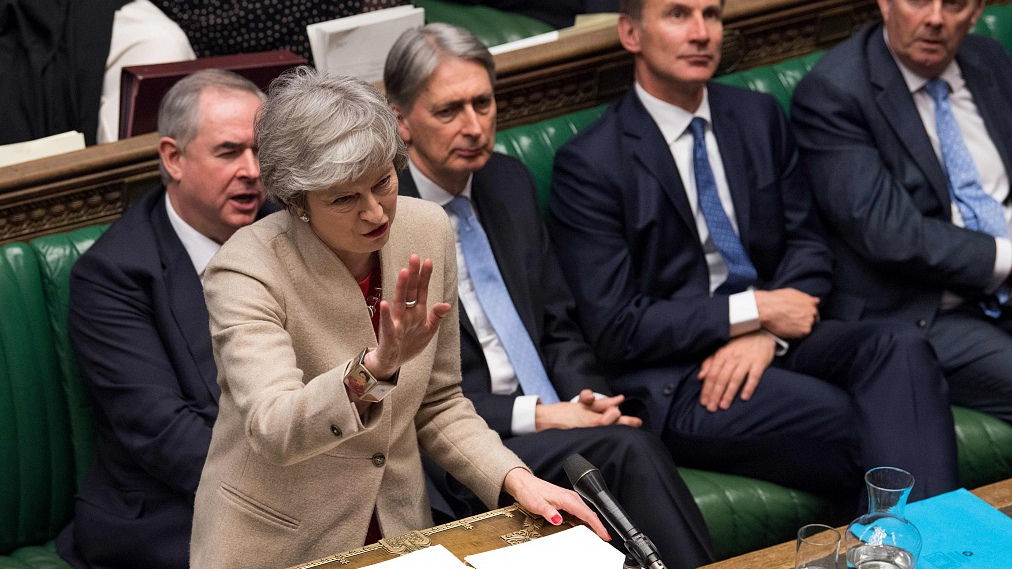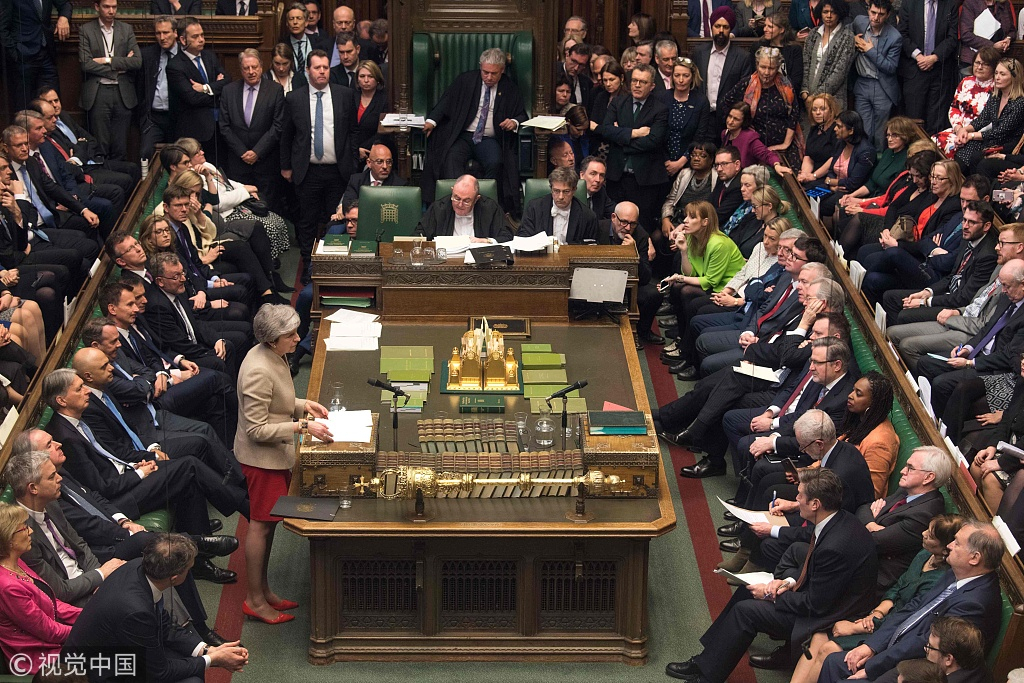
Opinion
12:10, 30-Mar-2019
Theresa May must accept the inevitable
Tom Fowdy

Editor's note: Tom Fowdy, who graduated with an MSc in Chinese Studies from Oxford University and majored in politics at Durham University, writes on the international relations of China and the Democratic People's Republic of Korea. The article reflects the author's views, and not necessarily those of CGTN.
Friday afternoon, in a move not surprising to anyone, saw British Prime Minister Theresa May's attempt to get a third vote on her withdrawal agreement with the European Union for Britain's departure, thwarted by the House of Commons. Although at a smaller margin than previously, owing to several high profile rebels finally getting on board to accept the deal, the agreement was nevertheless struck down again by a majority of 58. With the outcome demonstrating there is no clear way forward for the negotiated deal, Britain is now left in a state of turmoil with an April 12 deadline fast approaching to inform Europe what must be done next.
Make no mistake about it; most of the blame should be placed on May's shoulders. The Prime Minister has stubbornly stuck to a deal which was doomed from the start, beaten a dead horse with a stick and lost the race. Now, there is no other tenable option for Britain to move forward unless the government cedes the status quo with a general election. Otherwise, the UK is effectively stuck in limbo.
Although Theresa May has been under political pressure from Brussels to accept the withdrawal agreement that was offered, she has nevertheless proved time and again inadequate in reading broader political currents, making one miscalculation after another, all of which have strongly contributed to Britain's current predicament. Whilst it has been frustrating that Europe as a group has decided on an offer and refused to shift from that position, as is par for EU diplomatic strategy, it is only the Prime Minister who has ultimately undermined herself on each occasion.

Brexit supporters march in Fulham in the final leg of the March To Leave Rally on March 29, 2019, in London. /VCG Photo
Brexit supporters march in Fulham in the final leg of the March To Leave Rally on March 29, 2019, in London. /VCG Photo
The calling of a general election in 2017 to "strengthen her hand" was her first and foremost mistake. Misreading the polls and misreading public sentiment, she gravely overestimated her own strength, underestimated the Labour Party and in turn blew her parliamentary majority. In doing so, those opposed to Brexit and those advocating a harder Brexit, gained at her own expense, forcing untenable demands and expectations upon Downing Street.
Given this, May was seemingly unable to come to terms with a coherent or plausible vision at all for what Britain's departure should look like. Her proposals had no starting point, no endpoint and no selling point. The lack of leadership was on display for the world to see. Thus, owing to the inevitable compromises and pragmatism which would take the stage when the eventual deal came out, it was obvious what was being presented would be ultimately favorable to neither side.
But by this point, it was already too late. Brussels presented their offer and doubled down on it. The Prime Minister felt obligated to accept it, despite the clear opposition on display from within her own party, and owing to the adversarial nature of Britain's political system, the opposition.

Britain's Prime Minister Theresa May speaks during a debate in the House of Commons on the government's Withdrawal Agreement Bill, March 29, 2019. /VCG Photo
Britain's Prime Minister Theresa May speaks during a debate in the House of Commons on the government's Withdrawal Agreement Bill, March 29, 2019. /VCG Photo
Despite the obvious warning signs at hand, she did not choose to renegotiate or look for other options, but pinned herself to it, perhaps out of desperation. The first defeat of her deal was the obvious conclusion, but seemingly this wasn't enough to deter her as she pursued it again, and again, right up until the point of the scheduled time for Britain's departure itself. The outcome didn't change, but neither did she either. A pledge that she would resign if Parliament passed it, even in salami sliced phases, on Friday thus fell on deaf ears. Too little, too late.
Now, the United Kingdom has until April 12 to inform the European Union what it wants to do next. There are two clear choices, either a simple no-deal exit or a longer extension with the obligatory commitment to participate in European elections. Given neither party wants the former, we can assume it will be the latter. But this changes nothing; it is a delay with no feasible solution whatsoever with the same Prime Minister and the same deal still on the table. Parliament won't accept it, Theresa May seemingly won't come to terms with it, meaning Britain has no way forward whatsoever.
Thus, Downing Street must now accept the inevitable. There simply cannot be a Brexit, nor can there even be a cancellation of it if the status quo persists. The only way out is if Theresa May dumps the dead deal, ultimately concedes to a general election and lets the public decide, because her divided minority government has not been able to offer Britain a way forward. Yes, it might backfire for the Conservative party and cost them, but given everything that has happened so far, isn't it time to put country before party? If not, then a prolonged stalemate awaits.
(If you want to contribute and have specific expertise, please contact us at opinions@cgtn.com.)

SITEMAP
Copyright © 2018 CGTN. Beijing ICP prepared NO.16065310-3
Copyright © 2018 CGTN. Beijing ICP prepared NO.16065310-3